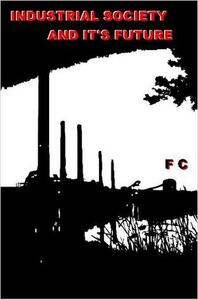You need to sign in or sign up before continuing.
Take a photo of a barcode or cover
informative
fast-paced
emotional
informative
inspiring
reflective
fast-paced
dark
sad
tense
fast-paced
What I've gained:
Insight into one of the greatest minds (objectively true) of the modern age and his opinions on where we are going as a country.
What I've lost:
The ability to work for the government in the future. (I promise I was just curious)
Insight into one of the greatest minds (objectively true) of the modern age and his opinions on where we are going as a country.
What I've lost:
The ability to work for the government in the future. (I promise I was just curious)
The author is obviously very intelligent. His premises, assertions, observations and anecdotes are highly focused on his thesis but lack necessary citation. The proposed destruction of large-scale technology is shocking and deserves more explanation (including from other voices) on why this is the only solution.
fast-paced
Can’t really recommend this one to anyone for any reason other than sheer morbid curiosity. TJK’s main goal in this book was to lay out his ideology and justify his terrorism, but his writing shows how little he has engaged with any critical work on the nature of revolution and social change. He dismisses “leftism” out of hand with no real definition of what that is (much of his arguments remind one of recent comments on “wokeness”). The few interesting observations he makes about the modern condition could probably be pretty well covered by a short explainer of Foucault or another 20th century thinker. It’s just not worth it.
stop ranting about leftism which you can't even define and tell me HOW to do the revolution, not enough application here Ted!
informative
inspiring
reflective
medium-paced
Kaczynski’s manifesto “Industrial Society and Its Future,” highlights the current and inevitable future consequences of the industrial revolution and technological development. He presents his ideas in a rational and coherent way that is easy to read for the general public, while simultaneously logical-driven and analytical.
Kaczynski views control of human beings as a necessity for the technological system's survival and efficiency:
“The system has to regulate human behavior closely in order to function. At work people have to do what they are told to do, otherwise production would be thrown into chaos. Bureaucracies have to be run according to rigid rules. To allow any substantial personal discretion to lower-level bureaucrats would disrupt the system and lead to charges of unfairness due to differences in the way individual bureaucrats exercised their discretion. It is true that some restrictions on our freedom could be eliminated, but generally speaking the regulation of our lives by large organizations is necessary for the functioning of industrial-technological society. The result is a sense of powerlessness on the part of the average person. It may be, however, that formal regulations will tend increasingly to be replaced by psychological tools that make us want to do what the system requires of us. (Propaganda, educational techniques, "mental health" programs, etc.)”
—Ted Kaczynski, “Industrial Society and Its Future, paragraph 114.
The reason for the system's undying desire to maximize efficiency at the cost of human freedom is the nature of such systems themselves. The industrial-technological system, along with most other forms of systems (e.g. nations, corporations, families, etc.), are all self-propagating systems, meaning that they strive for their survival and benefit in the short-term above all else: nations demonstrate this by fighting wars to gain influence or resources. Corporations always attempt to gain a higher net gain and (if required) a higher production base. Families, although generally weak today, used to rival other families and would commonly attempt to gain wealth and power as an entity, and in some societies would abandon weak newborns. Realizing that human nature is in the way of the system's propagation, it’s a certainty it will use various means of control to regulate and eventually eliminate that.
The system acts on a large-scale, interconnected infrastructural basis, which currently requires human labor in order to function properly, placing humans in a position where they must live their lives as a part of that large-scale system, and be as productive and obedient as needed for the system to function smoothly. Instead of working for your community or family, most people are coerced directly or indirectly to work for a large institution or corporation. Kaczynski argues that the opportunity that an individual has with their life and their careers is laid down by the system and not by the individual or small-scale community, placing individuals in a situation where the entire direction of their life is determined by an overarching machine. People can only become lawyers, doctors, technicians, etc. if there is a demand for those jobs and if the individual attends schooling where they are taught to be obedient; kids are taught to sit still and speak when spoken to and are given assignments, very akin to a workplace. It is true that an individual can alter the trajectory of their life to a degree, but only by changing their mindset and behavior in a way that is either beneficial or problematic for the system; an unruly individual wishing to turn their life for the “better” needs to learn obedience, and if a “good member of society” grows distressed over the tight mold humans are made to fit, and if they outlet it in a way that negatively affects their overall productivity, then there will most likely be severe social and financial consequences.
Seeing as it is the system's nature that requires humans to be productive and docile, while also striving for maximum efficiency at the cost of human freedom, by taking this principle, it’s inevitable that it will use certain technological advancements to do so in the not-so-distant future. The neuralink has already been invented, which can control digital devices by using the brain, but if it’s possible to use the neuralink to solve issues that are problematic for the system, it won’t stop short of doing so. It’s also predictable that genetic engineering will be one of the most effective tools for modifying human behavior in the future, which has the capability of completely altering and removing certain traits of an individual. When these advancements become a reality, human freedom and behavior will be under the complete control of the system, and most likely an elite few, rendering human society little more than that of a beehive.
Industrial Society and Its future presents the reality of the modern world clear-cut and logically, identifying the various factors which negatively impact individuals and society as a whole. Ever since the publishing of the book (1995), it has been shockingly prophetic in predicting the future, and has gained a recent upsurge of interest. All in all, Industrial Society and Its future is definitely worth a read.
hopeful
informative
inspiring
reflective
medium-paced
Verily, Industrial Society and Its Future is an eye-opening text; it is indeed a sober look at our society and the real nature of technology as an insidious and uncontrollable force with many dire consequences. Completely at odds with the mainstream narrative of technology as little more than a useful tool, Dr. Theodore Kaczynski comprehensively and thoroughly works his way through his arguments and addresses counterarguments in the process: Industrial-technological society has made life unfulfilling, makes human beings into mere cogs of the social machine, causes mass psychological problems, and will continue to strip human beings of autonomy, dignity, and freedom.
As a clever example of the “craziness of our society,” or in other words the lack of fulfillment and mass psychological problems, Kaczynski analyzes modern leftism and paints with a broad stroke two of their most prominent characteristics: “feelings of inferiority” and “oversocialization.” By these terms, he doesn’t just mean what one can infer, for the first instance he writes that it also means the “whole spectrum of related traits” including “low self-esteem, feelings of powerlessness, depressive tendencies, defeatism, guilt, self-hatred” and more. For the second instance, Kaczynski defines the oversocialized person as one who “continually [has] to deceive themselves about their own motives and find moral explanations for feelings and actions that in reality have a non-moral origin” (ISAIF, paragraph 25). This is because, as he rightly points out, no one in our society can act completely morally, thus the oversocialized person must deceive themselves constantly to cope with the constant guilt their over-socialization has placed upon their shoulders. With this analysis, the collectivism and proselytizing of leftists is made clear; the first aspect is caused by a lack of confidence in the leftist individual, and the second by a need to release and cope with immense guilt.
If leftists are indeed a clear example of the craziness of our society, then where does this particular craziness originate from? Kaczynski shrewdly recognizes the innate human need for meaningful goals that require hard work, and often autonomy. He also identifies the fact that modern industrial-technological society interferes quite heavily with this need, or process, as he coins it with the term the “Power Process.” Kaczynski posits that the inevitable interference with, and disruption of, the Power Process by technological society is the primary cause of the unusually large rates of psychological problems present today. He correctly points out that recurring failure to achieve one’s goals in life results in many negative mental afflictions like depression, defeatism, and more.
Kaczynski also correctly recognizes that the oversocialization of the left, and other peoples in society, is a result of the industrial-technological society’s need to control human behavior more than any other society in human history. He rightly identifies that every society has had to control human behavior and that our society depends on strict control of human behavior to function. Our behavior is not only controlled through education, socialization, and propaganda, as is pointed out, but it is also controlled through direct and indirect coercion, and such control is maintained and strengthened by technology and its development.
Ultimately, Industrial Society and Its Future is a comprehensive look at technology, the kind of society that comes with it, and what that holds in store for those of us subject to it. For those filled with loathing at what the wildly reckless, technological journey is bringing about, Dr Theodore Kaczynski’s Industrial Society and Its Future serves as a paramount text and wake-up call--one of the most important of our times.




